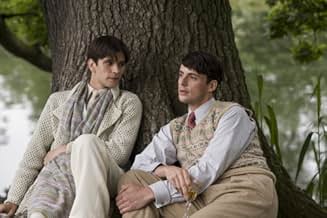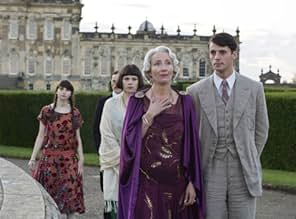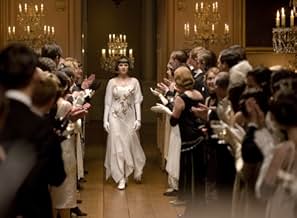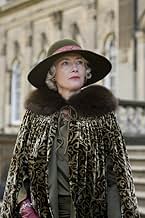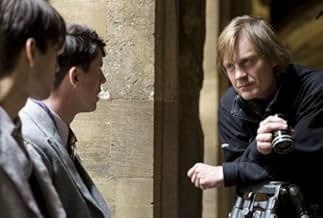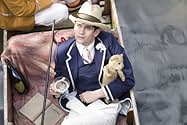A poignant story of forbidden love and the loss of innocence set in England prior to World War II.A poignant story of forbidden love and the loss of innocence set in England prior to World War II.A poignant story of forbidden love and the loss of innocence set in England prior to World War II.
- Director
- Writers
- Stars
- Awards
- 11 nominations total
- Director
- Writers
- All cast & crew
- Production, box office & more at IMDbPro
Featured reviews
Every once in a few decades something like Brideshead comes along. No wonder anyone would want to try to relive that magic! So now there is Brideshead the movie. That means the director had to grasp the original TV show in two hours, so no other choice than a 'The Best Of' compilation remains, it seems.The disadvantage of it is, that what is left out suddenly becomes painfully missing.
All of us who have watched the TV series know it is virtually impossible to surpass it, in film or TV production. Nevertheless, I tried to watch it without prejudice. Overall not a bad movie, but no, not the magical resonance the original had.
All I can do is summarize in details the pluses and minuses of the film versus the TV production so here it goes:
The fathers from original were two of the best actors of the century; John Geilgud (Shakespeare) and the (incomparable) Laurence Olivier. Geilgud plays brilliantly the teasing but not totally indifferent father, who seems stop Charles from the insipid surroundings in the summer but finally lets him go. In the TV series the actor is more serious, and the fun is not there. Laurence had probably one of the best performances of all, and clearly echoes his naughtiness as he portrayed in A Little Romance then a few years earlier. His unpredictability which finally makes him decide for his daughter is well done, especially considered his playground was virtually no more than a static death bed! And then the scene where he is offered a ride in a car down the steps, which he refuses since he doesn't want to admit it might be his last.
Matthew Goode does quite a good job as a substitute of Jeremy Irons. I like especially his ambivalent apparition (homosexual, heterosexual, both, or doesn't it matter?). But he lacks the wonderful narrating voice of Irons, which research has shown to be one of the best around. In the film the romance between Charles and Sebastian's sister is elaborated much more. Partially I agree with this choice. In the original not enough scenes were implanted for credibility, except probably the scene where Charles lights her cigarette. They were virtually strangers meeting again on the cruiser years later and nevertheless they seemed to suddenly hit it off. The sister was not what stood Charles' and Sebastian's friendship in the way. The filmmakers choose for more stress on their impending romance. I think the TV original did this better; it was the family that Charles became part of, and Sebastian's indifference to love that became unsurpassable problems. In original the mother was almost invisible, with the exception of some quotes on her son like 'I don't understand it', which summed it all up. We do not need the dialog in the film where she explains herself, and wonders why her kids hate her. Understatement is much more powerful, also in the scene 'I'll say no more' between Charles and Julia, in which it becomes clear religion has driven them apart. One sentence can be enough.
All this was at the cost of stress Sebastian could have had, and got in the TV original. Most of the magic of Brideshead was simply Anthony Andrews' performance. Worse, the movie clearly alludes to a homosexual relationship, which it did not need to be. Sebastian was a love object, and could be loved by anyone, in any way. But then again, it might be hard finding someone that could deliver the line about Sebastian as Irons narrated: 'his beauty, arresting'. Charm was the problem, the danger. That missed in this film. It was charm that nearly got Charles astray, as told by the queer friend years later in his atelier. The film omitted this important scene, where that friend tried to warn Charles for Sebastian. At the time we all thought it was a nasty remark, but later on he seemed to be right. Or was the charm not an illusion after all? The film simply did not have enough time to build up the charm Sebastian surely had in the TV original. In the TV series Charles was shown first with boring friends, and it then became shortly a coming of age story, where he got introduced in a more fun crowd with Sebastian. This phase delivered some of the best scenes of the story, with his queer friend talking loud over the campus, or Sebastian dressing up as a man with mustache. Sebastian showed Charles other worlds, which real or not, were unforgettable. The film had to rush this too much, and therefore the introduction scene with the spring eggs lost its magic.
One of the few pluses was much less stress on Cordelia, the little girl. But the minus was she acted as an indirect narrator of the importance of religion. Now it had to be compensated for in dialog with the mother and Julia, which was in TV better since there meaning came out of things not said.
Many things I missed, but you can not cram all in two hours. But lines like 'I would like to remember Sebastian, how he were that summer, when we walked through the enchanted place' should have been told again.
The end was nicely done, with Charles finally not pinching candlelight, symbolic for the charm of that family that was still alive in him. I liked there the Irons narrative though 'Was it all vanity? Etc.'
I would say, it was a brave attempt, something like making a remake of 2001, or Casablanca or Breakfast at Tiffany's, and the acting was all well done. Also camera work, and story adaptation. But who can surpass Anthony Andrews, or Jeremy Irons, or Gielgud or Olivier?
All of us who have watched the TV series know it is virtually impossible to surpass it, in film or TV production. Nevertheless, I tried to watch it without prejudice. Overall not a bad movie, but no, not the magical resonance the original had.
All I can do is summarize in details the pluses and minuses of the film versus the TV production so here it goes:
The fathers from original were two of the best actors of the century; John Geilgud (Shakespeare) and the (incomparable) Laurence Olivier. Geilgud plays brilliantly the teasing but not totally indifferent father, who seems stop Charles from the insipid surroundings in the summer but finally lets him go. In the TV series the actor is more serious, and the fun is not there. Laurence had probably one of the best performances of all, and clearly echoes his naughtiness as he portrayed in A Little Romance then a few years earlier. His unpredictability which finally makes him decide for his daughter is well done, especially considered his playground was virtually no more than a static death bed! And then the scene where he is offered a ride in a car down the steps, which he refuses since he doesn't want to admit it might be his last.
Matthew Goode does quite a good job as a substitute of Jeremy Irons. I like especially his ambivalent apparition (homosexual, heterosexual, both, or doesn't it matter?). But he lacks the wonderful narrating voice of Irons, which research has shown to be one of the best around. In the film the romance between Charles and Sebastian's sister is elaborated much more. Partially I agree with this choice. In the original not enough scenes were implanted for credibility, except probably the scene where Charles lights her cigarette. They were virtually strangers meeting again on the cruiser years later and nevertheless they seemed to suddenly hit it off. The sister was not what stood Charles' and Sebastian's friendship in the way. The filmmakers choose for more stress on their impending romance. I think the TV original did this better; it was the family that Charles became part of, and Sebastian's indifference to love that became unsurpassable problems. In original the mother was almost invisible, with the exception of some quotes on her son like 'I don't understand it', which summed it all up. We do not need the dialog in the film where she explains herself, and wonders why her kids hate her. Understatement is much more powerful, also in the scene 'I'll say no more' between Charles and Julia, in which it becomes clear religion has driven them apart. One sentence can be enough.
All this was at the cost of stress Sebastian could have had, and got in the TV original. Most of the magic of Brideshead was simply Anthony Andrews' performance. Worse, the movie clearly alludes to a homosexual relationship, which it did not need to be. Sebastian was a love object, and could be loved by anyone, in any way. But then again, it might be hard finding someone that could deliver the line about Sebastian as Irons narrated: 'his beauty, arresting'. Charm was the problem, the danger. That missed in this film. It was charm that nearly got Charles astray, as told by the queer friend years later in his atelier. The film omitted this important scene, where that friend tried to warn Charles for Sebastian. At the time we all thought it was a nasty remark, but later on he seemed to be right. Or was the charm not an illusion after all? The film simply did not have enough time to build up the charm Sebastian surely had in the TV original. In the TV series Charles was shown first with boring friends, and it then became shortly a coming of age story, where he got introduced in a more fun crowd with Sebastian. This phase delivered some of the best scenes of the story, with his queer friend talking loud over the campus, or Sebastian dressing up as a man with mustache. Sebastian showed Charles other worlds, which real or not, were unforgettable. The film had to rush this too much, and therefore the introduction scene with the spring eggs lost its magic.
One of the few pluses was much less stress on Cordelia, the little girl. But the minus was she acted as an indirect narrator of the importance of religion. Now it had to be compensated for in dialog with the mother and Julia, which was in TV better since there meaning came out of things not said.
Many things I missed, but you can not cram all in two hours. But lines like 'I would like to remember Sebastian, how he were that summer, when we walked through the enchanted place' should have been told again.
The end was nicely done, with Charles finally not pinching candlelight, symbolic for the charm of that family that was still alive in him. I liked there the Irons narrative though 'Was it all vanity? Etc.'
I would say, it was a brave attempt, something like making a remake of 2001, or Casablanca or Breakfast at Tiffany's, and the acting was all well done. Also camera work, and story adaptation. But who can surpass Anthony Andrews, or Jeremy Irons, or Gielgud or Olivier?
No love story can be altogether gratifying in which the central choices are decided by the mother of the woman in love, even less, when she is the mother of both lovers, and has faith that she is protecting their everlasting spirits. That is what seems to be the predicament in Evelyn Waugh's novel, now adapted into a stagnant film in which one is not invited to feel or react due to its own lack of feeling or solidly portrayed consequence.
This film version focuses on forbidden love and the death of purity, set before WWII. Matthew Goode, who was excellent as the villain in The Lookout, becomes spellbound with a noble family, first because of his friendship with a charming, provocative, apparently homosexual contemporary, and then his sister. The fluctuation of Goode's obsessions suggest the decay of a self-indulgent upper crust in England flanked by the two World Wars, related in the course of his recurring stays at the Brideshead estate. What's more fundamental to Waugh's story is the harsh Catholicism of the family, as imposed by their matriarch, played by Emma Thompson, the high point of the film by far. Their religious beliefs are confronted by the son's homosexuality, the daughter's adulterous liaison with Goode, and Goode's atheism.
There are two curious fathers in the film. Michael Gambon is one, still legitimately married sure enough, but is ostracized, living in a Venetian palazzo with his mistress, Greta Scacchi in an unexpected comeback. Goode's father is a definite oddball who lives enclosed in a London house and seemingly favors playing chess with himself to talking to his son.
The main character is a penniless, virtually parentless youth drifting through an alien social system. Goode plays him featurelessly really, a nondescript motor for the other characters. Ben Whishaw steals all of his scenes as the gay son. The daughter could definitely have been portrayed more warily. The actress, Hayley Atwell makes the most of her I suppose, but why would she marry the revolting and unbearable suitor instead of Goode?
I am sure that the reason this film is not very effective at all is because so much background and source material is condensed and maybe sacrificed into such a shorter running time. But why are so many other adaptations effective in spite of this factor?
This film version focuses on forbidden love and the death of purity, set before WWII. Matthew Goode, who was excellent as the villain in The Lookout, becomes spellbound with a noble family, first because of his friendship with a charming, provocative, apparently homosexual contemporary, and then his sister. The fluctuation of Goode's obsessions suggest the decay of a self-indulgent upper crust in England flanked by the two World Wars, related in the course of his recurring stays at the Brideshead estate. What's more fundamental to Waugh's story is the harsh Catholicism of the family, as imposed by their matriarch, played by Emma Thompson, the high point of the film by far. Their religious beliefs are confronted by the son's homosexuality, the daughter's adulterous liaison with Goode, and Goode's atheism.
There are two curious fathers in the film. Michael Gambon is one, still legitimately married sure enough, but is ostracized, living in a Venetian palazzo with his mistress, Greta Scacchi in an unexpected comeback. Goode's father is a definite oddball who lives enclosed in a London house and seemingly favors playing chess with himself to talking to his son.
The main character is a penniless, virtually parentless youth drifting through an alien social system. Goode plays him featurelessly really, a nondescript motor for the other characters. Ben Whishaw steals all of his scenes as the gay son. The daughter could definitely have been portrayed more warily. The actress, Hayley Atwell makes the most of her I suppose, but why would she marry the revolting and unbearable suitor instead of Goode?
I am sure that the reason this film is not very effective at all is because so much background and source material is condensed and maybe sacrificed into such a shorter running time. But why are so many other adaptations effective in spite of this factor?
As with any film which follows a beloved mini-series it is nearly impossible to escape the shadow. When watching this film you'll find yourself constantly comparing it to the mini-series and more often than not the memory of the mini-series comes out ahead.
That being said, I still very much enjoyed the film. As with other recent English remakes (Pride & Prejudice, BBC's Sense & Sensibility) you really appreciate the beauty of modern film making. The cinematography, the score, and the ever beautiful Castle Howard, Venice, and Oxford alone are worth the watching in my opinion. There are also some great performances. Matthew Goode's Charles rivals that of Jeremy Iron's, Hayley Atwell's Julia (in a more central role than that of the mini-series) was also quite good. I also found myself rather enjoying Charles' wife Celia (Anna Madeley) even in such a small role.
The real failure of the film seems to be the difficulty with compressing 11 hours into 2. Everything is forced to move faster and the more quite, gentle, and simple scenes are lost. What's left then is a distillation of the most dramatic moments. As a result the film loses the subtlety of the mini-series. The religious bits are played up a bit too much and makes the characters slightly unbelievable. Emma Thompson is great as always, but her character of Lady Marchmain as written is too over bearing, too controlling, too inhuman. The character of Sebastian is louder than in the mini-series and becomes jaded before you care much for him. Indeed, I didn't find myself caring particularly much for any of the characters except perhaps Charles.
Still, if you don't have 11 hours on hand to spend watching the mini-series, this is a suitable substitute and is worth watching at least once at any rate. As long as you don't go in expecting an equal to the mini-series you'll enjoy it and may even find a moment or two which improves upon the original.
That being said, I still very much enjoyed the film. As with other recent English remakes (Pride & Prejudice, BBC's Sense & Sensibility) you really appreciate the beauty of modern film making. The cinematography, the score, and the ever beautiful Castle Howard, Venice, and Oxford alone are worth the watching in my opinion. There are also some great performances. Matthew Goode's Charles rivals that of Jeremy Iron's, Hayley Atwell's Julia (in a more central role than that of the mini-series) was also quite good. I also found myself rather enjoying Charles' wife Celia (Anna Madeley) even in such a small role.
The real failure of the film seems to be the difficulty with compressing 11 hours into 2. Everything is forced to move faster and the more quite, gentle, and simple scenes are lost. What's left then is a distillation of the most dramatic moments. As a result the film loses the subtlety of the mini-series. The religious bits are played up a bit too much and makes the characters slightly unbelievable. Emma Thompson is great as always, but her character of Lady Marchmain as written is too over bearing, too controlling, too inhuman. The character of Sebastian is louder than in the mini-series and becomes jaded before you care much for him. Indeed, I didn't find myself caring particularly much for any of the characters except perhaps Charles.
Still, if you don't have 11 hours on hand to spend watching the mini-series, this is a suitable substitute and is worth watching at least once at any rate. As long as you don't go in expecting an equal to the mini-series you'll enjoy it and may even find a moment or two which improves upon the original.
The Granada people got it right in 1979 when they set out to film "Brideshead Revisited." They realized that Evelyn Waugh's great novel could not be done justice in a single film of two or even three hours. It had to be made into an extended mini-series. Thus, the great 11-part TV series of 1981 - the first and only great film version of Waugh's novel.
Yet, in 2008, BBC Films thought it was time for a remake. The result is this film adaptation. It lasts just over two hours. It skims over or skips characters. It changes the focus, and thus the story. It misses the essence of Waugh's story completely. So, it's more proper to call this a major revision - a revised story based on Waugh's novel.
Even Emma Thompson as Lady Marchmain and Michael Gambon as Lord Marchmain can't lift this revised story to an acceptable imitation. Apparently, because the story is so profound, BBC films chose to promote this as a remake of the TV series from Waugh' great novel. That being the case, one is led naturally to comparison. Thus, this film fails.
Still, for some fair acting by the cast, I give it five stars as though it were a different story entirely. After all, the cast can't be held accountable for the plot. Although Thompson's almost muted performance hints that she may realize she's in a far inferior work that has borrowed a great title.
Yet, in 2008, BBC Films thought it was time for a remake. The result is this film adaptation. It lasts just over two hours. It skims over or skips characters. It changes the focus, and thus the story. It misses the essence of Waugh's story completely. So, it's more proper to call this a major revision - a revised story based on Waugh's novel.
Even Emma Thompson as Lady Marchmain and Michael Gambon as Lord Marchmain can't lift this revised story to an acceptable imitation. Apparently, because the story is so profound, BBC films chose to promote this as a remake of the TV series from Waugh' great novel. That being the case, one is led naturally to comparison. Thus, this film fails.
Still, for some fair acting by the cast, I give it five stars as though it were a different story entirely. After all, the cast can't be held accountable for the plot. Although Thompson's almost muted performance hints that she may realize she's in a far inferior work that has borrowed a great title.
It's attributed to just about everybody - from Ginger Rogers to Milan Kundera - and it sounds so right: "There are no small parts, only small actors."
If you want proof and a real understanding of the adage, revisit "Brideshead Revisited," and behold the miracle of Emma Thompson's Lady Marchmain, sucking the life out of anything and anybody she touches, and Michael Gambon's delightfully dissolute Lord Marchmain. She has about 10 minutes on the screen, he perhaps four, and yet their characters will follow you out of the theater, and stay with you at length.
Thompson's work is especially dazzling because the mean, sanctimonious character is so clearly alien to the actress (in fact, I suspected miscasting when I first heard of her assignment) and also as the character is so exaggerated, almost a caricature. And yet, Thompson gives the challenge her all, and walks away with it; the performance has Best Supporting Actress written all over it.
It's difficult to believe that the man you see as Marchmain is the same actor who was the "Singing Detective" (of the superb BBC series, not the Robert Downey Jr. mishap). Gambon has a range as wide as all outdoors, and you never ever see effort in the performance. His amiable Marchmain - subtly hinting at a complex character under the surface - has a physical similarity to Gambon's Uncle Vanya on the London stage, but otherwise, it's a unique creation.
What else is there to this new "edition" of "Brideshead"? A great deal, but only if you're among those who missed both Evelyn Waugh's novel and the wonderful Granada TV realization 27 long years ago - Irons! Gielgud! Olivier! - how can you compete with that? So, if it's a first-time visit, see the movie by all means; if you can recite lines from the book or the TV series, you can survive without the new version.
In 135 minutes, the film is handling well what the TV series did so completely in - yes - 13 HOURS. Obviously, except for the basic story line (script by Jeremy Brock, of "The Last King of Scotland"), this is a different kind of animal, still "leisurely" enough, but unable to luxuriate in the smallest details as the series did. The director is Julian Jarrold, and he is doing far better than in his recent "Becoming Jane," keeps the story moving in a smooth fashion.
As to the leading roles in the film, they are all well acted, but without great impact. Matthew Goode is Charles Ryder, the focal character; Ben Whishaw is the slightly over-flamboyant Sebastian Flyte (who needs understating more than exaggerating - Anthony Andrews' performance in the TV series was exactly right); Hayley Atwell is Sebastian's sister (and rival for Charles' affection).
One amazing thing about "Brideshead" is how this story from a different time, about characters from a different world, remains interesting and meaningful. It's almost as if Waugh's work was bulletproof - not that these filmmakers were less than respectful to the author. A better test would be a Eurotrash opera version, heaven forfend.
If you want proof and a real understanding of the adage, revisit "Brideshead Revisited," and behold the miracle of Emma Thompson's Lady Marchmain, sucking the life out of anything and anybody she touches, and Michael Gambon's delightfully dissolute Lord Marchmain. She has about 10 minutes on the screen, he perhaps four, and yet their characters will follow you out of the theater, and stay with you at length.
Thompson's work is especially dazzling because the mean, sanctimonious character is so clearly alien to the actress (in fact, I suspected miscasting when I first heard of her assignment) and also as the character is so exaggerated, almost a caricature. And yet, Thompson gives the challenge her all, and walks away with it; the performance has Best Supporting Actress written all over it.
It's difficult to believe that the man you see as Marchmain is the same actor who was the "Singing Detective" (of the superb BBC series, not the Robert Downey Jr. mishap). Gambon has a range as wide as all outdoors, and you never ever see effort in the performance. His amiable Marchmain - subtly hinting at a complex character under the surface - has a physical similarity to Gambon's Uncle Vanya on the London stage, but otherwise, it's a unique creation.
What else is there to this new "edition" of "Brideshead"? A great deal, but only if you're among those who missed both Evelyn Waugh's novel and the wonderful Granada TV realization 27 long years ago - Irons! Gielgud! Olivier! - how can you compete with that? So, if it's a first-time visit, see the movie by all means; if you can recite lines from the book or the TV series, you can survive without the new version.
In 135 minutes, the film is handling well what the TV series did so completely in - yes - 13 HOURS. Obviously, except for the basic story line (script by Jeremy Brock, of "The Last King of Scotland"), this is a different kind of animal, still "leisurely" enough, but unable to luxuriate in the smallest details as the series did. The director is Julian Jarrold, and he is doing far better than in his recent "Becoming Jane," keeps the story moving in a smooth fashion.
As to the leading roles in the film, they are all well acted, but without great impact. Matthew Goode is Charles Ryder, the focal character; Ben Whishaw is the slightly over-flamboyant Sebastian Flyte (who needs understating more than exaggerating - Anthony Andrews' performance in the TV series was exactly right); Hayley Atwell is Sebastian's sister (and rival for Charles' affection).
One amazing thing about "Brideshead" is how this story from a different time, about characters from a different world, remains interesting and meaningful. It's almost as if Waugh's work was bulletproof - not that these filmmakers were less than respectful to the author. A better test would be a Eurotrash opera version, heaven forfend.
Storyline
Did you know
- TriviaDame Emma Thompson threatened to quit this movie if the producers persisted in pushing actress Hayley Atwell to lose weight. Atwell said that Harvey Weinstein even insulted her over lunch by saying: "You look like a fat pig on-screen. Stop eating so much."
- GoofsAfter the dinner, at which Charles first meets Lady Marchmain, the family go to pray in the private chapel. The ladies, as Roman Catholics, would have covered their heads with a scarf or a veil.
- Quotes
Sebastian Flyte: I asked too much of you. I knew it all along, really. Only God can give you that sort of love.
Details
- Release date
- Countries of origin
- Official site
- Languages
- Also known as
- Hôn Nhân Thượng Lưu
- Filming locations
- Production companies
- See more company credits at IMDbPro
Box office
- Budget
- $20,000,000 (estimated)
- Gross US & Canada
- $6,432,256
- Opening weekend US & Canada
- $339,616
- Jul 27, 2008
- Gross worldwide
- $13,451,186
- Runtime2 hours 13 minutes
- Color
- Sound mix
- Aspect ratio
- 2.35 : 1
Contribute to this page
Suggest an edit or add missing content



